For our Cook it at Home series, OPB visits Portland-area chefs and food-industry entrepreneurs to see how they prepare their favorite dishes in their home kitchens. This month, we caught up with some of our Cook it at Home alums to find out how they celebrate the holidays.
- Q&A with Mirna Attar, Ya Hala
- Q&A with Chong Choi, Choi's Kimchi Company
- Q&A with Jenn Louis, Lincoln Restaurant & Sunshine Tavern
- Q&A with Tyler Malek, Salt & Straw
- Q&A with Bonnie Morales, Kachka
- Q&A with Heidi Nestler, Heidi Nestler Cooking Classes
- Q&A with Gabe Rosen, Biwa
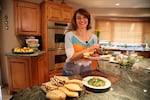
Chef Mirna Attar of Ya Hala restaurant
Kayo Lackey / OPB
OPB: What do you cook for holiday dinners?
Mirna Attar: I cook a Christmas dinner every year for friends and family. We usually host about 45-50 people in our home on Christmas Day. It is another chance for us to all get together and celebrate each other's company.
OPB: Are there any unique dishes you cook? Any family or cultural traditions?
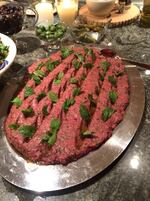
Kibbeh Neyyeh
Joyce Attar
MA: While we tend to have 10-15 dishes, I usually start with Brie canapés with a sundried tomato pesto as an appetizer. This is usually wiped out within the first half hour. Another dish I love to make is Kibbeh Neyyeh, a Lebanese take on steak tartare. We purée a beef tenderloin and knead it with bulgar pilaf, allspice, mint and onion and drizzle it with olive oil. Finally, we all love eating my stuffed Cornish game hen which I fill with basmati rice, ground beef, chestnuts and herbs.
We always have a batch of fresh olives at the dinner table for Christmas. We cure the olives in September and October and they are ready for the holiday season. Salty and bitter, olives bring everyone around the dinner table before, during and after the meal.
OPB: Do you have any interesting memories about holiday food?
MA: As a kid we visited family and friends from home to home on Christmas Day. We were always given a Jordan almond, chocolate and a shot of cognac in their homes. The family with the finest chocolate and cognac would earn bragging rights that year.
Chong Choi, Choi's Kimchi Company

Matt & Chong Choi of Choi's Kimchi Company
John Kin / OPB
OPB: What do you cook for holiday dinners?
Chong Choi: You can find me in the kitchen cooking for just about every holiday in the winter.
As the owner of a kimchi company it's kind of funny, but most people don't think of kimchi as a holiday food. But you can be sure there will be many different varieties of kimchi that sprinkle our holiday spread. I cook a mixture of American and Korean food for the holidays and am usually cooking for about 20 family and friends. Turkey, ham, mashed potatoes, stuffing, green bean casserole, japchae (sweet potato noodles, vegetables, beef), bossam (sliced pork belly served with fresh kimchi and garlic) and kimchi are almost always present.
OPB: Are there any unique dishes you cook? Any family or cultural traditions?
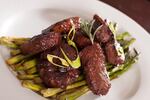
Galbi Jjim
Courtesy of Matt & Chong Choi
CC: Galbi Jjim is probably the favorite dish during the holidays in my household. It's a Korean braised beef short rib dish. My kids can't get enough of it.
Sometimes we'll play Yut Nori. Especially around New Year's. It's a traditional Korean board game. Sebeh is also a big Korean tradition involving the children wishing their elders a Happy New Year by performing a deep bow and being rewarded with money.
My kids hated me for doing this, but I would gather all the kids and make them perform a mini talent show. My niece would play the flute, and my sons would play piano or guitar. They loathed it.
OPB: Do you have any interesting memories about holiday food?
CC: The first year I came to the States, I was really shocked at how different the holiday food was here. It was nothing like the food back home. I didn't know there were turkeys that big. I actually thought it was a giant chicken! It piqued my interest and I learned how to prepare them from my mom who moved here before I did.
Jenn Louis, Lincoln Restaurant & Sunshine Tavern

Chef Jenn Louis of Lincoln Restaurant and Sunshine Tavern
John Kin / OPB
OPB: What do you cook for holiday dinners?
Jenn Louis: I celebrate Hanukkah. I am Jewish. So for Hanukkah, I always make a braised brisket and it's different than a smoked brisket you typically see at barbecue joints. It's braised really, really slowly and it's very tender, and we serve that with traditional potato latkes. I always make either an apple or pear sauce to go with it. I like an applesauce, but I usually use pears and vanilla. We always have jelly doughnuts, which are the traditional dessert for Hanukkah, called sufganiyot.
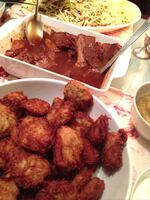
Potato latkes & braised brisket
Jenn Louis
OPB: Are there any unique dishes you cook? Any family or cultural traditions?
JL: My husband and I are both Jewish. We are both from different kinds of heritage. My family is from Eastern Europe, and his family are Greek Jews, so we kind of blend a little bit of the two traditions together for our holidays.
OPB: Do you have any interesting memories about holiday food?

Bacon apple pie
Jenn Louis
JL: Christmas Day is really fun for us because we don't celebrate Christmas, but we always go out for Chinese food for dinner later that evening. That's pretty traditional. It's kind of a joke that it's always the Jewish Christmas is Chinese food.
Another thing to add ... I have a really good friend who loves bacon, so I made him a bacon apple pie for Thanksgiving one year as a treat.

Tyler Malek
John Kin / OPB
OPB: What do you cook for holiday dinners?
Tyler Malek: I love roasting the birds for each meal, typically turkey for Thanksgiving and duck for Christmas. I'm not sure why I always try to sign up for these. There's something about the perfectly crispy skin and the joy people have when you bring out the main course!
OPB: Are there any unique dishes you cook? Any family or cultural traditions?
TM: My grandma has a pretty killer oyster casserole recipe. Buttery, salty and pleasantly fishy! I remember growing up and always looking forward to this casserole! After looking back on it, the funny thing about our grandma's famous oyster casserole was that we were eating this 'delicacy' in rural Montana — not until I was in my 20s did I realize that the oysters were all from a can.
OPB: Do you have any interesting memories about holiday food?
TM: My stepdad, although culinarily challenged, was the bearer of warmed Parker House rolls. He used to buy WAY too many par-cooked rolls and microwave them till they were WAY too undercooked. With a slab of butter, he would pass the doughy doughnut-like rolls around between my brothers and me as we all played games and watched football.
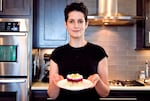
Bonnie Morales, chef and owner of Kachka.
Kayo Lackey
OPB: What do you cook for holiday dinners?
Bonnie Morales: For Hanukkah: latkes, applesauce, carrot tsimmes, apple cider doughnuts.
OPB: Are there any unique dishes you cook? Any family or cultural traditions?
BM: Latkes are the only real family/cultural tradition. I couldn't imagine Hanukkah without them. Besides being big on Hanukkah for most people, they are something that my grandfather used to make year-round. He was famous for them (in the family, that is). Belarus, where my family is from, is known as potato country, so fried potato pancakes are just part of the daily fare. They are known as Dryaniki. I think serving them with applesauce is something that was picked up here in the States. Back in Belarus they were just eaten with sour cream (smetana). I'd say the type of applesauce I make these days is somewhat unique. A little smoother and brighter than the Motts variety.
As an adult, I've taken on making doughnuts on Hanukkah. Again, this is not a family tradition, but something that is common amongst American Jews. I press fresh apple juice for them and I think they are pretty tasty (though not all that unique, I suppose).
Carrot tsimmes is a dish that has no historical or family tie to Hanukkah, but I always crave it this time of year so I tend to make it for Hanukkah. I do know it to be a popular dish in the Jewish canon. It is a slow braise of meat (I bounce between short rib or chicken thighs) in a whole bunch of shredded carrots. Cooked carrots on their own are very one note, but the meaty braise transforms them to something craveable.
OPB: Do you have any interesting memories about holiday food?
BM: In my childhood home, the menorah was always on the kitchen table. I remember my brother and I getting in trouble for using it to roast stuff while eating dinner. You know, potatoes or other items off the dinner plate. We even got a marshmallow going before we were busted. Real interactive dining!
Heidi Nestler, Heidi Nestler Cooking Classes
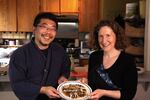
Heidi Nestler and her husband, Daisuke Fukushima, who makes natto at home
John Kin / OPB
OPB: What do you cook for holiday dinners?
Heidi Nestler: When our family lived in an old house in Kyoto without central heat, the four of us would often huddle together in the winter and cook at the table, in large part to keep warm! We love nabe (Japanese one-pot dishes) where we cook vegetables and meat or fish in a broth. My favorite nabe in Kyoto was made with thinly sliced duck meat. The broth at the end is so rich and fatty, so good mixed with a little rice or noodles! Come to think of it, I always have soup or nabe on solstice, going back to when the kids were little.
OPB: Are there any unique dishes you cook? Any family or cultural traditions?
HN: On December 26th, we typically take down all Christmas decorations and launch into preparations for Japanese New Year's. Basically we clean a lot, then cook a lot. A little before midnight, we eat toshikoshi soba ("year-end noodles"). In Japan, we could hear the temple bell start to toll 108 times around this time of the night. Each ring represents an earthly temptation in Buddhist belief. It sounds corny, but since living in Portland we will sometimes listen to a recording of a resonant temple bell tolling while we slurp our noodles! Also, my German grandmother's tradition was to eat pickled herring at midnight, which goes surprisingly well with soba.

Osechi
Courtesy of Heidi Nestler
Osechi, the New Year's foods that we spend the last days of the year busily preparing and procuring, are meant to last for a few days. Most of the dishes have auspicious symbolism and we take care to arrange them in plates and boxes that only get pulled out at New Year's. My favorite osechi dish is kazunoko, or herring roe. It is salty and crunchy like no other crunchy food I know. We start New Year's Day with saké infused with Chinese medicinal herbs, toso. There are a few other favorite foods that are not traditional for New Year's, but which I make every year to have during the first couple of days of January: chirashi, or scattered sushi; oden, a winter stew with fish cakes and chikuzen-ni, a medley of wonderful root vegetables and chicken simmered in a soy-based broth.
OPB: Do you have any interesting memories about holiday food?
HN: Growing up, Christmas Eve dinner meant something a little fancy. My father would always ask if we were having pheasant under glass, but we never did. I do remember small birds, though, like squab and Cornish game hens, and lots of stuffed mushrooms and Brie. My mom would also sometimes make pizza fondue to appeal to me. It's still all about the melted cheese for me, I guess. These days our tradition is to serve raclette.
Christmas Day we always had a traditional meal which centered on ham or turkey. I grew up in upstate New York, where we would have big storms that would knock out the power for days sometimes. This happened one Christmas, and I will never forget my mom in her apron and snow boots carefully carrying the turkey in its roasting pan up a hill to cook in our neighbors' gas oven. And then her deliberate steps back down the hill with our steaming turkey. I thought she was amazing because she didn't drop it!

John Rosman/OPB
OPB: What do you cook for holiday dinners?
Gabe Rosen: Ours change every year. Sometimes we do things with our family, sometimes with our Biwa family, sometimes a combination, and honestly we absolutely love to spend Christmas Day, particularly just the two of us, at home, the restaurant is closed, everything else is closed.
OPB: Are there any unique dishes you cook? Any family or cultural traditions?
GR: I love to cook, for the two of us or a crowd, and over the holidays I like to cook turkeys for a crowd or Dungeness crabs if it is the two of us. Kina makes a very good cheesecake (for a crowd), and we also both really like to come together on an afternoon for a long German-style Christmas Day brunch buffet in our kitchen enjoyed in our pajamas. Kina makes biscuits, we have real soft scrambled eggs, smoked fish, lots of tea (Earl Grey for Kina, Pu-erh for Gabe), vollkornbrot from Fressen or spelt from Little T, little salads, cheese, endless butter, yogurt, some pastries just to be safe (but less in recent years). We will gladly do this for guests, but absolutely love to do it just the two of us and the cats. I also make and we eat a lot of soup. Right now we are deep in a fish sauce/turkey soup that is really hitting the spot.
OPB: Do you have any interesting memories about holiday food?
GR: I wouldn't say that either of us are particularly traditional about the holiday season. I like to get a present from Kina. I grew up eating 'Thanksgiving Dinner Part Two' for Christmas because my dad likes it and likes cooking it. We liked it, too. My dad has a fairly ritualized holiday meal that I grew up eating that, among other recognizable items (dressing, gravy, bird), also contains Japanese potstickers (gyoza) that a restaurant owner/friend taught him to make and that we all like and are somehow part of the Biwa story, too.